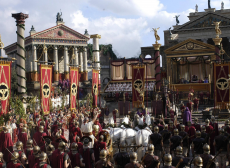
Trajan had not only defeated the Dacians and the Parthians but had also gained control over a great number of black sea and eastern peoples during his reign which no doubt brought a great amount of wealth to the Empire, particularly from Parthia and Armenia who were rich in gold. Although we have little information on roman economy and only the records of Pliny the Younger as any real primary source, we may note in support of this that the second century saw a great increase in ‘cash handouts’, and marriages and coming of age ceremonies were frequently paid for and made joyous affairs by the state treasury. The 2nd century AD had begun excellently for the Roman Empire, but the transition of one Emperor to another could easily change that. Indeed in contrast to Trajan, Hadrian ‘the restless emperor’ did not focus on expansion and even abandoned some territories but built a series of walls marking the boundaries of Rome’s Empire, the most famous of which was of course Hadrian’s Wall in Britain.This stark contrast to Trajan ignited conspiracies that his death bed decision to choose Hadrian had been a lie and the four senior senators who voiced their opinions on this were ‘mysteriously put to death’ apparently without Hadrian’s orders. Whether true or just very coincidental the beginning of Hadrian’s reign does not fit the image of a supposed ‘Golden Age’ in Rome.
In fact Hadrian spent much of his time travelling the empire and seemed to take the position of Emperor as an opportunity to explore more than to lead. Furthermore, he was devoted to all things Greek from which he took the nickname ‘Graeculus’ and even made Athens a second capital. When we consider the pride of the Roman people and their tradition of taking what is Greek and improving upon it (even in the Latin language over Ancient Greek) this can’t have been a popular decision. Furthermore, Hadrian was known to enjoy the company of boys which, though accepted and even praised in Ancient Greece was frowned upon in Rome and was certainly not an example to be set by the Emperor. Finally, when Hadrian’s choice of heir seemed baffling and his closest male relatives spoke out they were either killed or forced into suicide. The conclusion of all this is that Hadrian was ‘deeply unpopular at the time of his death’ and Antoninus even had to convince the senate to deify him.Nevertheless, despite Hadrian’s unpopularity he was not murdered during his 21 year reign and despite his bizarre ways he was popular with the army, and Gibbon states that Hadrian would frequently visit the troops alongside the army’s best generals to inspire the military trainees.Perhaps then we realise that a ‘Golden Age’ may not be determined by an overall goodness of heart, but the prosperity of the Empire. Hadrian may have been unpopular for a variety of reasons but he wasn’t a dictator like Domitian had been at the end of the first century. Despite Hadrian’s unorthodoxy the economy, military might and society within the Empire did not dwindle and so he is still considered one of the five good emperors in a period that does appear to be a Roman ‘Golden Age’ In fact Birley considers him more like Augustus than Trajan, a lover of the arts and culture and preferring peaceful negotiation over war.Though perhaps less heroic than Trajan’s rule it might have been more sustainable and certainly allowed the arts to flourish in the ‘Golden Age’.

0 Comment:
Be the first one to comment on this article.